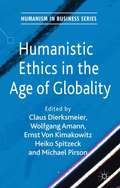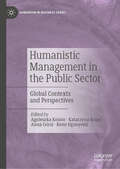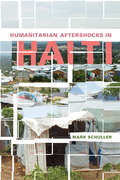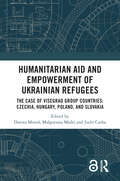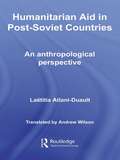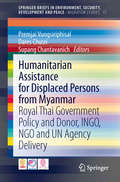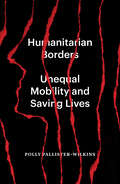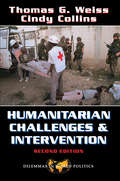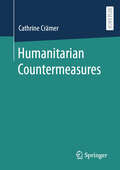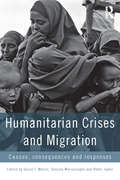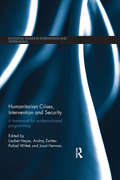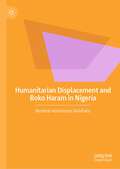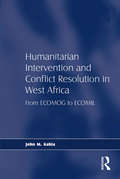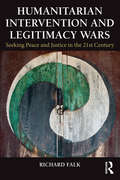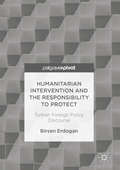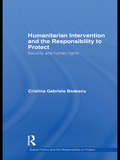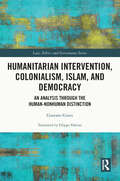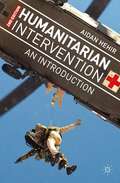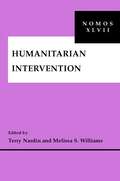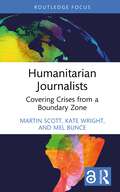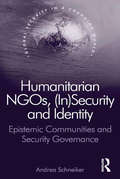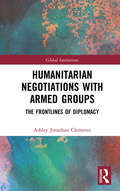- Table View
- List View
Humanism in a Non-Humanist World (Studies in Humanism and Atheism)
by Monica R. MillerThis book brings together a diverse and wide-ranging group of thinkers to forge unsuspecting conversations across the humanist and non-humanist divide. How should humanism relate to a non-humanist world? What distinguishes “humanism” from the “non-humanist?” Readers will encounter a wide-range of perspectives on the terms bringing together this volume, where “Humanism” “Non-Humanist” and “World” are not taken for granted, but instead, tackled from a wide variety of perspectives, spaces, discourses, and approaches. This volume offers both a pragmatic and scholarly account of these terms and worldviews allowing for multiple points of analytical and practical points of entry into the unfolding dialogue between humanism and the non-humanist world. In this way, this volume is attentive to both theoretically and historically grounded inquiry and applied practical application.
Humanismo y crítica democrática
by Edward W. SaidLa educación humanista tradicional -sostiene Said- lleva mucho tiempo siendo atacada por los tecnócratas de la cultura y la política que desean un cambio profundo en la orientación de los estudios y, por extensión, en la forma de entender e interpretar el mundo. Siguiendo este razonamiento, el celebrado autor de Orientalismo expone en esta obra sus razones para seguir apostando por una forma democrática de humanismo, una manera diversa de entender la educación que incorpore al desarrollo cultural un proyecto amplio de emancipación social. Defensor apasionado de la educación humanista y de los valores democráticos frente a los excesos consumistas de la sociedad contemporánea y el pensamiento neoliberal, Edward W. Said propone un diálogo fluido y ágil entre las diferentes tradiciones culturales como estrategia necesaria para revitalizar las denostadas humanidades, con el fin de que la cultura se acerque cada vez más al hombre y a sus ideales. Las palabras, dice el profesor Said, son agentes vitales, imprescindibles, para el cambio histórico y político, al tiempo que la lectura, entendida como aprendizaje, nos ayuda a ser mejores y a cuestionar, desmontar y reformular el mundo constantemente. Edward W. Said nos ayuda a comprender quiénes somos y qué debemos pensar si aspiramos a ser actores morales y no sirvientes del poder.NOAM CHOMSKY Said es una brillante y única amalgama de profesor, esteta y activista político que desafía y estimula nuestro pensamiento en todas las áreas.The Washington Post Edward W. Said es uno de los principales pensadores de esta época.The New York Observer
Humanistic Ethics in the Age of Globality
by Claus Dierksmeier Wolfgang Amann Michael Pirson Ernst Von Kimakowitz Heiko SpitzeckCultures and moral expectations differ around the globe, and so the management of corporate responsibilities has become increasingly complex. Is there, however, a humanistic consensus that can bridge cultural and ethnic divides and reconcile the diverse and contrary interests of stakeholders world-wide? This book seeks to answer that question.
Humanistic Management in the Public Sector: Global Contexts and Perspectives (Humanism in Business Series)
by Kemi Ogunyemi Agnieszka Konior Katarzyna Kopeć Anna GóralRelative to the private sector, the public sector has always had a greater demand for scientific research in its running and decision making and, more recently, there has been a significant increase in the demand for research on humanism and ethics more broadly. In response, this book seeks to analyse the public sector through the lens of humanistic management, referring to its three-stepped approach – respect for human dignity, ethical reflection and decision-making, and stakeholder engagement. The establishment of a humanistic approach in the public sector should be a launchpad for humanistic transformation in businesses and in other organisations. With contributors and research from around the globe, this book explores topics such as the work-family balance, collective leadership, the COVID pandemic, environmental issues and public entrepreneurship. It will be of interest to researchers and students in the fields of business ethics, public management theory and practice, public management history and human resource management.
Humanitarian Aftershocks in Haiti
by Mark SchullerThe 2010 earthquake in Haiti was one of the deadliest disasters in modern history, sparking an international aid response--with pledges and donations of $16 billion--that was exceedingly generous. But now, five years later, that generous aid has clearly failed. In Humanitarian Aftershocks in Haiti, anthropologist Mark Schuller captures the voices of those involved in the earthquake aid response, and they paint a sharp, unflattering view of the humanitarian enterprise. Schuller led an independent study of eight displaced-persons camps in Haiti, compiling more than 150 interviews ranging from Haitian front-line workers and camp directors to foreign humanitarians and many displaced Haitian people. The result is an insightful account of why the multi-billion-dollar aid response not only did little to help but also did much harm, triggering a range of unintended consequences, rupturing Haitian social and cultural institutions, and actually increasing violence, especially against women. The book shows how Haitian people were removed from any real decision-making, replaced by a top-down, NGO-dominated system of humanitarian aid, led by an army of often young, inexperienced foreign workers. Ignorant of Haitian culture, these aid workers unwittingly enacted policies that triggered a range of negative results. Haitian interviewees also note that the NGOs "planted the flag," and often tended to "just do something," always with an eye to the "photo op" (in no small part due to the competition over funding). Worse yet, they blindly supported the eviction of displaced people from the camps, forcing earthquake victims to relocate in vast shantytowns that were hotbeds of violence. Humanitarian Aftershocks in Haiti concludes with suggestions to help improve humanitarian aid in the future, perhaps most notably, that aid workers listen to--and respect the culture of--the victims of catastrophe.
Humanitarian Aid and Empowerment of Ukrainian Refugees: The Case of Visegrad Group countries: Czechia, Hungary, Poland, and Slovakia
by Dorota Moroń, Małgorzata Madej and Judit CsobaThe book presents good practices in humanitarian assistance and empowerment of Ukrainian refugees in various areas: emergency aid to large groups crossing the border, organisation of support in places of temporary stay, learning local languages, inclusion of children in school and adults in the labour market, and inclusion in the local community. It indicates the forms of international protection and the scope of their application by migrants from Ukraine, and discusses the temporary protection status dedicated to Ukrainian refugees.The volume will be of great interest to scholars and researchers of migration and diaspora studies, immigration law, and public policy.
Humanitarian Aid in Post-Soviet Countries: An Anthropological Perspective (Central Asian Studies)
by Laetitia Atlani-DuaultAn anthropologist among aid workers. Her objective: to study that exotic tribe, humanitarian and development workers, along with their state and non-state partners, as they "export democracy" to post-soviet countries of Central Asia and the Caucasus. Her method: to join the tribe for ten years. From New York to Alma-Ata, by way of Geneva and Baku, Laëtitia Atlani-Duault provides both an understanding of the individuals working in the field and a critical analysis of the sweeping political implications of NGO activities. A focus on supposedly "de-politicized" policy areas (notably the prevention of HIV/AIDS epidemic) provides wider insights into the objectives and practices of international aid workers in countries beset by rising poverty, drug trafficking, prostitution, and decaying education and health services. The author also provides a rich canvas of human stories, from the "workshops" in which diametrically opposed political approaches often clash to the occasional small triumphs in which effective public health interventions are worked out. This timely book will be of great interest not only to scholars of post-soviet countries, but also to those interested in humanitarian and development aid worldwide. It will also be relevant for the study of the anthropology of development, as well as medical and political anthropology.
Humanitarian Assistance for Displaced Persons from Myanmar
by Supang Chantavanich Premjai Vungsiriphisal Dares ChusriThis book is one of four volumes on a major empirical migration study by leading Thai migration specialists from Chulalongkorn University (Bangkok) for the United Nations Development Programme (UNDP). This volume examines the protracted refugee situation at the Thai-Myanmar border. Displaced persons are kept in closed settlements, and this has limited their self-reliance. A resettlement program has been implemented and many refugees have been accepted in resettlement countries. Repatriation is not recommended as a durable solution unless Myanmar becomes a safe place for return. Funding and intervention policies of international organizations and NGOs vary. Donors prefer to switch humanitarian assistance to development aid. The book provides realistic policy recommendations for a durable solution for refugees at the borders. Practitioners and policymakers from governments, international organizations and NGOs will benefit from its findings. The volume is also helpful for anyone studying forced migration and its denouement in the globalized age.
Humanitarian Borders: Unequal Mobility and Saving Lives
by Polly Pallister-WilkinsThe seamy underside of humanitarianismWhat does it mean when humanitarianism is the response to death, injury and suffering at the border? This book interrogates the politics of humanitarian responses to border violence and unequal mobility, arguing that such responses mask underlying injustices, depoliticise violent borders and bolster liberal and paternalist approaches to suffering. Focusing on the diversity of actors involved in humanitarian assistance alongside the times and spaces of action, the book draws a direct line between privileges of movement and global inequalities of race, class, gender and disability rooted in colonial histories and white supremacy and humanitarian efforts that save lives while entrenching such inequalities. Based on eight years of research with border police, European Union officials, professional humanitarians, and grassroots activists in Europe&’s borderlands, including Italy and Greece, the book argues that this kind of saving lives builds, expands and deepens already restrictive borders and exclusive and exceptional identities through what the book calls humanitarian borderwork.
Humanitarian Challenges And Intervention: Second Edition
by Thomas G WeissThere are two distinct contemporary challenges to the relief of war-induced human suffering--one within the institutions that make up the international humanitarian system, the other on the ground in war zones. Varied interests, resources, and organizational structures within institutions hamper the effectiveness of efforts on behalf of war victims. And at the same time, on the ground, there are ethical, legal, and operational challenges and dilemmas that require actors continually to choose a course of action with associated necessary evils.Humanitarian challenges and intervention concerns within the international humanitarian system--combined with the domestic context of armed conflicts--often yield policies that do not serve the immediate requirements of victims for relief, protection of rights, stabilization, and reconstruction. Based on compelling, up-to-date case studies of the post-Cold War experience in Central America, northern Iraq, Somalia, the former Yugoslavia, and the African Great Lakes, the authors Thomas G. Weiss and Cindy Collins make recommendations for a more effective international humanitarian system.
Humanitarian Countermeasures
by Cathrine Crämer“[I]f humanitarian intervention is, indeed, an unacceptable assault on sovereignty, how should we respond to a Rwanda, to a Srebrenica—to gross and systematic violations of human rights that offend every precept of our common humanity?” – Kofi Annan This question asked by Kofi Annan over twenty years ago has not lost its relevance since, as for instance demonstrated by the paralysis of the Security Council in the face of the continued use of chemical weapons by the Syrian regime against its own population. The present work addresses the question of whether the unilateral use of force by states for humanitarian purposes, hence without a Security Council authorization, could be justified via the concept of 'humanitarian countermeasures’. In this context, humanitarian countermeasures are derived from the notion of countermeasures, which stems from the law of state responsibility as conceived in Art. 49 et seq. DARS and traditionally only refers to peaceful, bilateral measures. The core of the study is to open up countermeasures to humanitarian military action, discuss the legal feasibility of such an approach, while effectively containing the potential for abuse by establishing a legal framework. In a final step, concrete conditions for humanitarian countermeasures are defined, which can guide a reinterpretation of countermeasures and the further development of customary law. About the author Cathrine Crämer studied law at the Humboldt European Law School at the HU Berlin, the Université Paris II Panthéon Assas (Maîtrise en Droit in Private International Law) and at King's College London (LL.M. in Transnational Law). She obtained her doctorate at the LMU Munich, where she worked as a research assistant and taught public international law. Cathrine Crämer is currently a legal trainee at the Permanent Mission of Germany to the United Nations in New York.
Humanitarian Crises and Migration: Causes, Consequences and Responses
by Susan F. Martin, Sanjula Weerasinghe and Abbie TaylorWhether it is the stranding of tens of thousands of migrant workers at the Libyan–Tunisian border, or the large-scale displacement triggered by floods in Pakistan and Colombia, hardly a week goes by in which humanitarian crises have not precipitated human movement. While some people move internally, others internationally, some temporarily and others permanently, there are also those who become "trapped" in place, unable to move to greater safety. Responses to these "crisis migrations" are varied and inadequate. Only a fraction of "crisis migrants" are protected by existing international, regional or national law. Even where law exists, practice does not necessarily guarantee safety and security for those who are forced to move or remain trapped. Improvements are desperately needed to ensure more consistent and effective responses. This timely book brings together leading experts from multi-disciplinary backgrounds to reflect on diverse humanitarian crises and to shed light on a series of exploratory questions: In what ways do people move in the face of crisis situations? Why do some people move, while others do not? Where do people move? When do people move, and for how long? What are the challenges and opportunities in providing protection to crisis migrants? How might we formulate appropriate responses and sustainable solutions, and upon what factors should these depend? This volume is divided into four parts, with an introductory section outlining the parameters of "crisis migration," conceptualizing the term and evaluating its utility. This section also explores the legal, policy and institutional architecture upon which current responses are based. Part II presents a diverse set of case studies, from the earthquake in Haiti and the widespread violence in Mexico, to the ongoing exodus from Somalia, and environmental degradation in Alaska and the Carteret Islands, among others. Part III focuses on populations that may be at particular risk, including non-citizens, migrants at sea, those displaced to urban areas, and trapped populations. The concluding section maps the global governance of crisis migration and highlights gaps in current provisions for crisis-related movement across multiple levels. This valuable book brings together previously diffuse research and policy issues under the analytical umbrella of "crisis migration." It lays the foundations for assessing and addressing real challenges to the status quo, and will be of interest to scholars, policy makers, and practitioners committed to seeking out improved responses and ensuring the dignity and safety of millions who move in the context of humanitarian crises.
Humanitarian Crises, Intervention and Security: A Framework for Evidence-Based Programming (Routledge Studies in Intervention and Statebuilding)
by Rafael Wittek Andrej Zwitter Liesbet Heyse Joost HermanThis book presents a new framework of analysis to assess natural and man-made disasters and humanitarian crises, and the feasibility of interventions in these complex emergencies. The past half-century has witnessed a dramatic increase in such crises - such as in Haiti, Iraq and Sudan - and this volume aims to pioneer a theory-based, interdisciplinary framework that can assist students and practitioners in the field to acquire the skills and expertise necessary for evidence-based decision-making and programming in humanitarian action. It has four major objectives: To provide a tool for diagnosing and understanding complex emergencies, and build on the concepts of state security and human security to provide a ‘Snap-Shot Analysis’ of the status quo; To provide a tool for analysing the causes of crises as well as the related stakeholder field; To provide a frame to structure and analyse the information required to evaluate, monitor and/or design interventions for different actors on a project and/or programme level; To combine concepts used in the humanitarian field with underlying theory in a practically relevant way. The book will be of much interest to students of humanitarian intervention, human security, peacebuilding, development studies, peace studies and IR in general.
Humanitarian Displacement and Boko Haram in Nigeria
by Medinat Abdulazeez MalefakisThe book analyses the management of the internal displacement caused by activities of Boko Haram’s terrorist insurgence in Nigeria. With over 3.1m persons displaced, the humanitarian crisis is at teeter ends with acute malnourishment, inadequate wash and non-relief materials, improper hygiene facilities, and lack of access to basic relief aid for displaced persons. The array of humanitarian organisations belies the concrete living conditions of displaced persons and calls to question the huge resources assumed to be expended on managing the humanitarian crisis in the northeast of Nigeria and the Lake Chad Basin in general. Based on ethnographic research in IDP camps, the book chronicles the concrete living conditions of displaced persons and argues that IDPs in Northeastern Nigeria have been victimised first by Boko Haram’s terrorism, and then victimised again by inefficient, un-coordinated, and unsuitable displacement management programs. This book also explicate the roles played by the Nigerian government and international aid agencies in managing this displacement, vis-à-vis a comparative analysis of similar, but better managed displacement situations in Kenya, Lebanon, and Turkey.
Humanitarian Hypocrisy: Civilian Protection and the Design of Peace Operations
by Andrea L. EverettIn Humanitarian Hypocrisy, Andrea L. Everett maps the often glaring differences between declared ambitions to protect civilians in conflict zones and the resources committed for doing so. Examining how powerful governments contribute to peace operations and determine how they are designed, Everett argues that ambitions-resources gaps are a form of organized hypocrisy. Her book shows how political compromises lead to disparities between the humanitarian principles leaders proclaim and what their policies are designed to accomplish. When those in power face strong pressure to protect civilians but are worried about the high costs and dangers of intervention, Everett asserts, they allocate insufficient resources or impose excessive operational constraints. The ways in which this can play out are illustrated by Everett's use of original data and in-depth case studies of France in Rwanda, the United States in Darfur, and Australia in East Timor and Aceh. Humanitarian Hypocrisy has a sad lesson: missions that gesture toward the protection of civilians but overlook the most pressing security needs of affected populations can worsen suffering even while the entities who doom those missions to failure assume the moral high ground. This is a must-read book for activists, NGO officials, and policymakers alike.
Humanitarian Intervention and Conflict Resolution in West Africa: From ECOMOG to ECOMIL
by John M. KabiaThe end of the Cold War has been characterized by a wave of violent civil wars that have produced unprecedented humanitarian catastrophe and suffering. Although mostly intra-state, these conflicts have spread across borders and threatened international peace and security. One of the worst affected regions is West Africa which has been home to some of Africa's most brutal and intractable conflicts for more than a decade. This volume locates the peacekeeping operations of the Economic Community of West African States (ECOWAS) within an expanded post-Cold War conceptualization of humanitarian intervention. It examines the organization's capacity to protect civilians at risk in civil conflicts and to facilitate the processes of peacemaking and post-war peace-building. Taking the empirical case of ECOWAS, the book looks at the challenges posed by complex political emergencies (CPEs) to humanitarian intervention and traces the evolution of ECOWAS from an economic integration project to a security organization, examining the challenges inherent in such a transition.
Humanitarian Intervention and Legitimacy Wars: Seeking Peace and Justice in the 21st Century
by Richard FalkIn the aftermath of the Cold War there has been a dramatic shift in thinking about the maintenance of peace and security on a global level. This shift is away from a preoccupation with how to prevent major wars between sovereign states to a preoccupation about non-state transnational warfare and violence and strife within states in a world order that continues to be juridically and politically delimited by spatial ideas of national sovereignty and national independence as signified by international boundaries. In this book, Richard Falk draws upon these changes to examine the ethics and politics of humanitarian intervention in the 21st Century. As well as analysing the theoretical and conceptual basis of the responsibility to protect, the book also contains a number of case studies looking at Iraq, Afghanistan, Kosovo and Syria. The final section explores when humanitarian intervention can succeed and the changing nature of international political legitimacy in countries such as India, Tibet, South Africa and Palestine. This book will be of interest to students of International Relations theory, Peace Studies and Global Politics.
Humanitarian Intervention and the Responsibility to Protect
by Birsen ErdoganThis book offers a discursive analysis of the Turkish Foreign Policy on Humanitarian Interventions (HI) and the doctrine of the Responsibility to Protect (R2P). Across the chapters the author addresses important questions, such as: what is the position of the HI and R2P in the Turkish foreign policy discourse? Is there any variation between cases when it comes to the use of these concepts? How do these discourses shape/change/transform or sustain the Turkish identity? Despite the tendency in some countries to incorporate HI and R2P principles into their foreign policy (UK, Netherlands, Canada, Japan), and the fact that some countries are lobbying to make these principles a part of international or UN law, in the developing world these policies and concepts have not gained widespread recognition or approval. Countries like China, Brazil and India approach these concepts with suspicion or with reservation. The same tendency can be observed in the MENA region and in some parts of Africa and Asia. In this book, the author looks at the reasons behind these differences in approach and explores how the concept of identity affects Turkish foreign policy specifically. This study is invaluable for researchers and students of R2P and HI and foreign policy discourse in general.
Humanitarian Intervention and the Responsibility to Protect: Security and human rights (Global Politics and the Responsibility to Protect)
by Cristina Gabriela BadescuThis book explores attempts to develop a more acceptable account of the principles and mechanisms associated with humanitarian intervention, which has become known as the ‘Responsibility to Protect’ (R2P). Cases of genocide and mass violence have raised endless debates about the theory and practice of humanitarian intervention to save innocent lives. Since the humanitarian tragedies in Rwanda, Burundi, Bosnia, Kosovo and elsewhere, states have begun advocating a right to undertake interventions to stop mass violations of human rights from occurring. Their central concern rests with whether the UN’s current regulations on the use of force meet the challenges of the post-Cold War world, and in particular the demands of addressing humanitarian emergencies. International actors tend to agree that killing civilians as a necessary part of state formation is no longer acceptable, nor is standing by idly in the face of massive violations of human rights. And yet, respect for the sovereign rights of states remains central among the ordering principles of the international community. How can populations affected by egregious human rights violations be protected? How can the legal constraints on the use of force and respect for state sovereignty be reconciled with the international community’s willingness and readiness to take action in such instances? And more importantly, how can protection be offered when the Security Council, which is responsible for authorizing the use of force when threats to international peace and security occur, is paralyzed? The author addresses these issues, arguing that R2P is the best framework available at present to move the humanitarian intervention debate forward. This book will be of interest to students of the responsibility to protect, war and conflict studies, human security, international organisations, security studies and IR in general.
Humanitarian Intervention, Colonialism, Islam and Democracy: An Analysis through the Human-Nonhuman Distinction (Law, Ethics and Governance)
by Gustavo GozziThis book offers a critical analysis of the European colonial heritage in the Arab countries and highlights the way this legacy is still with us today, informing the current state of relations between Europe and the formerly colonized states. The work analyses the fraught relationship between the Western powers and the Arab countries that have been subject to their colonial rule. It does so by looking at this relationship from two vantage points. On the one hand is that of humanitarian intervention—a paradigm under which colonial rule coexisted alongside “humanitarian” policies pursued on the dual assumption that the colonized were “barbarous” peoples who wanted to be civilized and that the West could lay a claim of superiority over an inferior humanity. On the other hand is the Arab view, from which the humanitarian paradigm does not hold up, and which accordingly offers its own insights into the processes through which the Arab countries have sought to wrest themselves from colonial rule. In unpacking this analysis the book traces a history of international and colonial law, to this end also using the tools offered by the history of political thought. The book will be of interest to students, academics, and researchers working in legal history, international law, international relations, the history of political thought, and colonial studies.
Humanitarian Intervention: An Introduction 2nd edition
by Aidan HehirA broad-ranging introduction to the theory, practice and politics of humanitarian intervention in the contemporary world. This second edition has been fully updated and includes a new chapter on Libya and the Arab Spring.
Humanitarian Intervention: NOMOS XLVII (NOMOS - American Society for Political and Legal Philosophy #1)
by Terry Nardin Melissa S. WilliamsSomalia, Haiti, Bosnia, and Kosovo. All are examples where humanitarian intervention has been called into action. This timely and important new volume explores the legal and moral issues which emerge when a state uses military force in order to protect innocent people from violence perpetrated or permitted by the government of that state. Humanitarian intervention can be seen as a moral duty to protect but it is also subject to misuse as a front for imperialism without regard to international law.In Humanitarian Intervention, the contributors explore the many questions surrounding the issue. Is humanitarian intervention permitted by international law? If not, is it nevertheless morally permissible or morally required? Realistically, might not the main consequence of the humanitarian intervention principle be that powerful states will coerce weak ones for purposes of their own? The current debate is updated by two innovations in particular, the first being the shift of emphasis from the permissibility of intervening to the responsibility to intervene, and the second an emerging conviction that the response to humanitarian crises needs to be collective, coordinated, and preemptive. The authors shed light on the timely debate of when and how to intervene and when, if ever, not to.Contributors: Carla Bagnoli, Joseph Boyle, Anthony Coates, Thomas Franck, Brian D. Lepard, Catherine Lu, Pratap Bhanu Mehta, Terry Nardin, Thomas Pogge, Melissa S. Williams, and Kok-Chor Tan.
Humanitarian Journalists: Covering Crises from a Boundary Zone (Routledge Focus on Journalism Studies)
by Martin Scott Kate Wright Mel BunceThis book documents the unique reporting practices of humanitarian journalists – an influential group of journalists defying conventional approaches to covering humanitarian crises. Based on a 5-year study, involving over 150 in-depth interviews, this book examines the political, economic and social forces that sustain and influence humanitarian journalists. The authors argue that – by amplifying marginalised voices and providing critical, in-depth explanations of neglected crises – these journalists show us that another kind of humanitarian journalism is possible. However, the authors also reveal the heavy price these reporters pay for deviating from conventional journalistic norms. Their peripheral position at the ‘boundary zone’ between the journalistic and humanitarian fields means that a humanitarian journalist’s job is often precarious – with direct implications for their work, especially as ‘watchdogs’ for the aid sector. As a result, they urgently need more support if they are to continue to do this work and promote more effective and accountable humanitarian action. A rigorous study of how unique professional practices can be produced at the ‘boundary zone’ between fields, this book will interest students and scholars of journalism and communication studies, sociology and humanitarian studies. It will also appeal to those interested in studies of news and media work as occupational identities.
Humanitarian NGOs,: Epistemic Communities and Security Governance (Global Security in a Changing World)
by Andrea SchneikerIncreasingly humanitarian NGOs operate in the context of armed conflicts where the security risks are higher than in contexts of natural disaster. Working in Afghanistan, Somalia, Sudan, South Sudan, Pakistan and Sri Lanka is particularly dangerous for humanitarians. This existential threat affects the physical existence of aid workers and the implementation of humanitarian programs, and the core beliefs of humanitarians and the underlying principles of humanitarian action. For NGOs it is difficult to accept that they are attacked despite their good intentions, sometimes even by the very communities they seek to help. For these reasons, humanitarian NGOs have to change their approaches to security by not only adapting their policies, procedures and structures to the changing environment, but also reviewing the underlying principles of their work. This book contributes to debates by demonstrating how issues of (in)security affect humanitarian NGOs and the humanitarian identity, situating the structural changes within the humanitarian NGO community in the context of conflict aid governance and explains how non-state actors establish their own governance structures, independent from state-sponsored solutions, and contributes to the emerging literature on the redefinition of the concept of epistemic communities.
Humanitarian Negotiations with Armed Groups: The Frontlines of Diplomacy (Global Institutions)
by Ashley Jonathan ClementsHumanitarians operate on the frontlines of today’s armed conflicts, where they regularly negotiate to provide assistance and to protect vulnerable civilians. This book explores this unique and under-researched field of humanitarian negotiation. It details the challenges faced by humanitarians negotiating with armed groups in Yemen, Myanmar, and elsewhere, arguing that humanitarians typically negotiate from a position of weakness. It also explores some of the tactics and strategies they use to overcome this power asymmetry to reach more favorable agreements. The author applies these findings to broader negotiation scholarship and investigates the implications of this research for the field and practice of humanitarianism. This book also demonstrates how non-state actors – both humanitarians and armed groups – have become increasingly potent diplomatic actors. It challenges traditional state-centric approaches to diplomacy and argues that non-state actors constitute an increasingly crucial vector through which international relations are replicated and reconstituted during contemporary armed conflict. Only by accepting these changes to the nature of diplomacy itself can the causes, symptoms, and solutions to armed conflict be better managed. This book will be of interest to scholars concerned with conflict resolution, negotiation, and mediation, as well as to humanitarian practitioners themselves.


